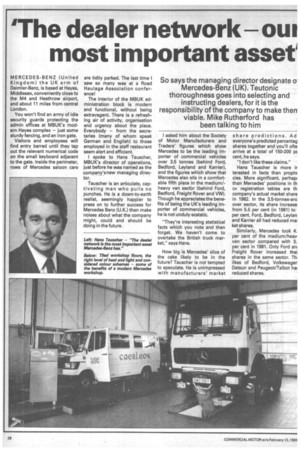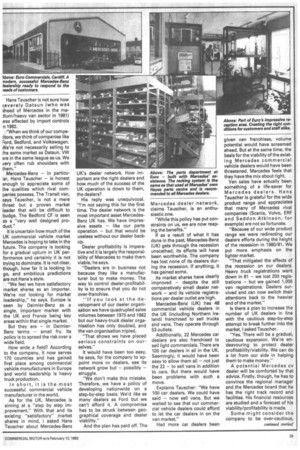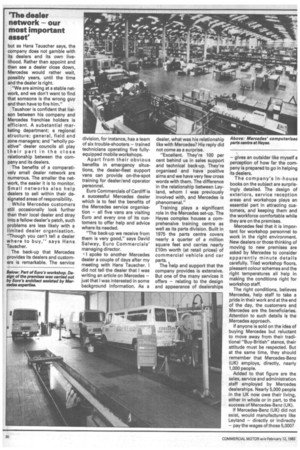'The dealer network ow most important asset'
Page 30

Page 31

Page 32

If you've noticed an error in this article please click here to report it so we can fix it.
So says the managing director designate o. Mercedes-Benz (UK). Teutonic thoroughness goes into selecting and instructing dealers, for it is the responsibility of the company to make then viable. Mike Rutherford has been talking to him
MERCEDES-BENZ (United Kingdom) the UK arm of Daimler-Benz, is based at Hayes, Middlesex, conveniently close to the M4 and Heathrow airport, and about 11 miles from central London.
You won't find an army of idle security guards protecting the admin offices at MBUK's modern Hayes complex — just some sturdy fencing, and an iron gate.
Visitors and employees will find entry barred until they tap out the relevant numerical code on the small keyboard adjacent to the gate. Inside the perimeter, rows of Mercedes saloon cars are tidily parked. The last time I saw so many was at a Road Haulage Association conference!
The interior of the MBUK administration block is modern and functional, without being extravagent. There is a refreshing air of activity, organisation and urgency about the place. Everybody — from the secretaries (many of whom speak German and English) to those employed in the staff restaurant seem alert and efficient.
I spoke to Hans Tauscher, MBUK's director of operations, just before he was named as the company'snew managing director.
Tauscher is an articulate, capti v a ti n g man who pulls no punches. He is a down-to-earth realist, seemingly happier to press on to further success for Mercedes Benz (U.K.) than make noises about what the company might, could and should be doing in the future. I asked him about the Society of Motor Manufacturers and Traders' figures which show Mercedes to be the leading importer of commercial vehicles over 3.5 tonnes (behind Ford, Bedford, Leyland and Karrier), and the figures which show that Mercedes also sits in a comfortable fifth place in the medium!heavy van sector (behind Ford, Bedford, Freight Rover and VW). Though he appreciates the benefits of being the UK's leading importer of commercial vehicles, he is not unduly ecstatic.
"They're interesting statistical facts which you note and then forget. We haven't come to overtake the British truck market," says Hans.
How big is Mercedes' slice of the cake likely to be in the future? Tauscher is not tempted to speculate. He is unimpressed with manufacturers' market share predictions. Ad everyone's predicted percentag shares together and you'll ofte arrive at a total of 150-200 rot cent, he says.
"I don't like these claims."
Hans Tauscher is more ir terested in facts than prophc cies. More significant, perhapl than Mercedes' positions in th cv registration tables are th company's actual market share in 1982. In the 3.5-tonnes-anc over sector, its share increase' from 5.5 per cent (in 1981) to per cent. Ford, Bedford, Leylan and Karrier all had reduced mai ket shares.
Similarly, Mercedes took 4. per cent of the medium/heav van sector compared with per cent in 1981. Only Ford an Freight Rover increased thei shares in the same sector. Thi likes of Bedford, Volkswagen Datsun and Peugeot/Talbot ha( reduced shares. Hans Tauscher is not sure how ;everely Datsun (who was ahead of Mercedes in the mehum/heavy van sector in 1981)
as affected by import controls n 1982.
"When we think of our compe:itors, we think of companies like Ford, Bedford, and Volkswagen. Ne're not necessarily selling to he same market as Datsun. VW are in the same league as us. We very often rub shoulders with them."
Mercedes-Benz — in particular, Hans Tauscher — is honest enough to appreciate some of the qualities which rival companies possess. The Transit van, says Tauscher, is not a mere threat but a proven market leader that will be difficult to budge. The Bedford CF is seen as a "very well designed product."
It is uncertain how much of the UK commercial vehicle market Mercedes is hoping to take in the future. The company is looking for a gradual upturn in UK performance and certainly it is not trying to dominate. It is not clear, though, how far it is looking to go, and ambitious predictions are not Hans's style.
"We feel we have satisfactory market shares as an importer. We're not looking for market leadership," he says. Europe is seen by Daimler-Benz as a single, important market with the UK and France being key areas within that single market.
But they are — in DaimlerBenz terms — small fry. Its policy is to spread the risk over a wide field.
How wide a field? According to the company, it now serves 170 countries and has gained first place among commercial vehicle manufacturers in Europe and world leadership is heavy truck production.
In short, it is the most successful commercial vehicle manufacturer in the world.
As for the UK, Mercedes is aiming at a "step by step improvement." With that and its existing "satisfactory" market shares in mind, I asked Hans Tauscher about Mercedes-Benz UK's dealer network. How important are the right dealers and how much of the success of the UK operation is down to them, the dealers?
His reply was unequivocal. "I'm not saying this for the first time. The dealer network is the most important asset MercedesBenz UK has. We have impressive assets — like our parts operation — but that would be useless without our dealer backup.
Dealer profitability is imperative and it is largely the responsibility of Mercedes to make them viable, he says.
"Dealers are in business not because they like a manufacturer but to make money. The way to control dealer-profitability is to ensure that you do not over-franchise.
"If you look at the development of our dealer organisation we have quadrupled sales volumes between 1975 and 1982 but our heavy-truck dealer organisation has only doubled, and the van organisation tripled.
"That shows we have placed serious constraints on ourselves."
It would have been too easy, he says, for the company to appoint more cv dealers, see its network grow but — possibly — struggle.
"We don't make this mistake. Therefore, we have a policy of developing nationwide on a step-by-step basis. We'd like as many dealers as Ford but we can't afford it. A compromise has to be struck between geographical coverage and dealer viability."
And the plan has paid off. The Mercedes dealer network, claims Tauscher, is an enthusiastic one.
"While this policy has put constraints on us, we are now reaping the benefits."
If as a result of what it has done in the past, Mercedes-Benz (UK) gets through the recession unscathed, its efforts will have been worthwhile. The company has lost none of its dealers during the recession. If anything, it has gained some. Its market shares have clearly improved — despite the still comparatively small dealer network — and its vehicle registrations per dealer outlet are high.
Mercedes-Benz (UK) has 48 commercial vehicle dealers in the UK (including Northern Ireland) franchised to sell trucks and vans. They operate through 53 outlets.
Additionally, 22 Mercedes car dealers are also franchised to sell light commercials. There are 100 car dealers in all in the UK. Seemingly, it would have been easy to allow them all — not just the 22 — to sell vans in addition to cars. But there would have been problems with such a move.
Explains Tauscher: "We have 100 car dealers. We could have said — now sell vans. But we waited to see that our commercial vehicle dealers could afford to let the car dealers in on the van market."
Had more car dealers been given van franchises, volume potential would have screamed ahead. But at the same time, the basis for the viability of the existing Mercedes commercial vehicle dealers would have been threatened. Mercedes feels that they have the mix about right.
Van sales have actually been something of a life-saver for Mercedes dealers. Hans Tauscher is grateful for the wide product range and appreciates that many of Mercedes rival companies (Scania, Volvo, ERF and Seddon Atkinson, for example) are not so fortunate.
"Because of our wide product range we were redirecting our dealers efforts during the height of the recession in 1980/81. We put more emphasis on the lighter market.
"That mitigated the effects of the recession on our dealers. Heavy truck registrations went down in 81 — we lost 200 registrations — but we gained 1,000 van registrations. Dealers survived and can now switch their attentions back to the heavier end of the market."
Is there a plan to increase the number of UK dealers in line with the cautious step-by-step attempt to break further into the market, I asked Tauscher.
"Yes. There will be a gradual, cautious expansion. We're endeavouring to protect dealer profitability/viability. We can do a lot from our side in helping them to make money."
A potential Mercedes cv dealer will be comforted by that advice. Firstly, though, he has to convince the regional manager and the Mercedes board that he has the right track record and facilities. His financial resources are studied and a forecast of his viability/profitability is made.
Some might consider the company to be over-cautious, but as Hans Tauscher says, the company does not gamble with its dealers and its own livelihood. Rather than appoint and then see a dealer close down, Mercedes would rather wait, possibly years, until the time and the dealer is right.
"We are aiming at a stable network, and we don't want to find that someone is the wrong guy and then have to fire him."
Taushcer is confident that liaison between his company and Mercedes franchise holders is efficient. A substantial marketing department; a regional structure; general, field and zone managers; and "wholly positive" dealer councils all play their part in the close relationship between the company and its dealers.
The benefits of a comparatively small dealer network are numerous. The smaller the network, the easier it is to monitor. Small networks also help dealers to sell within their designated areas of responsibility.
While Mercedes customers still occasionally look further than their local dealer and stray into a fellow dealer's patch, such problems are less likely with a limited dealer organisation. "Though you can't tell a dealer where to buy," says Hans Tauscher.
The back-up that Mercedes provides its dealers and customers is remarkable. The service division, for instance, has a team of six trouble-shooters — trained technicians operating five fullyequipped mobile workshops.
Apart from their obvious benefits in emergency situations, the dealer-fleet support vans can provide on-the-spot training for dealer/and operator personnel.
Euro Commercials of Cardiff is a successful Mercedes dealer which is to feel the benefits of the Mercedes service organisation — all five vans are visiting Euro and every one of its customers to offer help and advice where its needed.
"The back-up we receive from them is very good," says David Salway, Euro Commercials' managing director.
• I spoke to another Mercedes dealer a couple of days after my meeting with Hans Tauscher. I did not tell the dealer that I was writing an article on Mercedes — just that I was interested in some background information. As a dealer, what was his relationship like with Mercedes? His reply did not come as a surprise.
"Excellent. They're 100 per cent behind us in sales support and technical back-up. They're organised and have positive aims and we have very few cross words with them. The difference in the relationship between Leyland, whom I was previously involved with, and Mercedes is phenomenal."
Training plays a significant role in the Mercedes set-up. The Hayes complex houses a comprehensive training centre as well as its parts division. Built in 1975 the parts centre covers nearly a quarter of a million square feet and carries nearly £10m worth (at retail prices) of commercial vehicle and car parts.
The help and support that the company provides is extensive. But one of the many services it offers — relating to the design and appearance of dealerships — gives an outsider like myself a perception of how far the company is prepared to go in helping its dealers.
The company's in-house books on the subject are surprisingly detailed. The design of exteriors, service reception areas and workshops plays an essential part in attracting customers, and keeping them and the workforce comfortable while they are on the premises.
Mercedes feel that it is important for workshop personnel to work in the right environment. New dealers or those thinking of moving to new premises are asked by Mercedes to consider apparently minute details carefully. Tiled workshop floors, pleasant colour schemes and the right temperatures all help in making the conditions right for workshop staff.
The right conditions, believes Mercedes, help staff to take a pride in their work and at the end of the day, the customers and Mercedes are the beneficiaries. Attention to such details is the Mercedes approach.
If anyone is sold on the idea of buying Mercedes but reluctant to move away from their traditional "Buy-British" stance, their attitude must be respected. But at the same time, they should remember that Mercedes-Benz (UK) employs, directly, nearly 1,000 people.
Added to that figure are the sales, service and administration staff employed by Mercedes dealerships. Nearly 5,000 people in the UK now owe their living, either in whole or in part, to the success of Mercedes-Benz (UK).
If Mercedes-Benz (UK) did not exist, would manufacturers like Leyland — directly or indirectly — pay the wages of those 5,000?
































































































